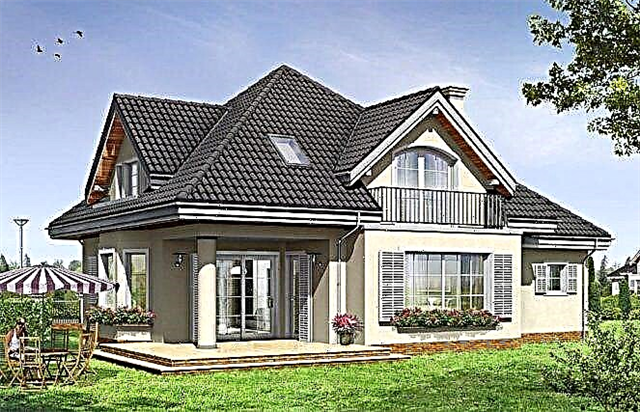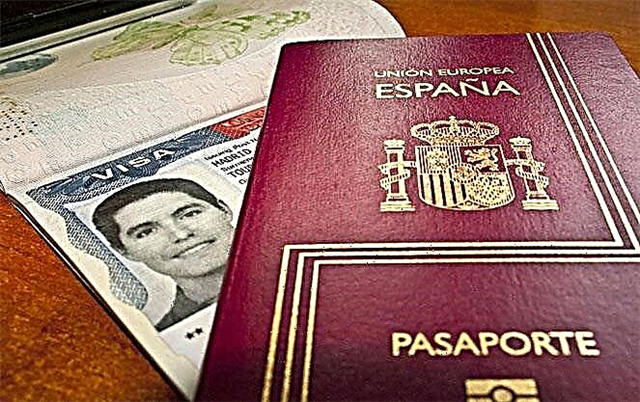For Russians, Spain is attractive not only as a popular tourist destination, but also as a destination for immigration. A high standard of living and social standards, a rapidly developing economy, growing well-being of the population, a warm climate, hundreds of kilometers of beaches and a unique Spanish way of life are just a few of what Russians are looking for here. But only those who have issued a residence permit can stay in the country for a long time. Residence permit in Spain, as well as in other European countries, is issued for specific purposes.

What gives and what obliges a residence permit in Spain
In accordance with Art. 30 of the Law "On the Rights, Freedoms and Social Integration of Foreigners" No. 4/2000 of 11.01.2000 (Sobre derechos y libertades de los extranjeros en España y su integración social), any foreigner wishing to stay in Spain for more than 90 days in a row (except for students exchange, foreign interns and volunteers), must apply for a residence permit (Permiso de residencia, PDR).
That is, the main function of a Spanish residence permit is a residence permit; without it, having only a visa, one can only be in the “stay” status. In addition, a Spanish residence permit entitles you to:
- visa-free travel to other Schengen countries, as well as to many other countries outside the EU;
- obtaining education, both basic school education (for children of immigrants), as well as specialized secondary and higher education;
- participation in the public health insurance system and receiving medical care on the same basis as the Spaniards;
- employment (depending on the basis for residence, a foreigner can obtain a temporary residence permit without the right to work, or with the possibility of employment);
- opening your own business, including as an individual entrepreneur;
- observance of labor, social and other guarantees from the state and the employer;
- Permanent residence, and subsequently citizenship, depending on the period of residence on the basis of a residence permit.
Foreigners who receive a PDR acquire resident status, which imposes a number of responsibilities on them, including:
- pay taxes on all income, regardless of source and country of origin;
- have a sufficient amount of money and legitimate sources of their receipt for their own support and the maintenance of their family;
- comply with the laws of Spain, including the rules of residence and migration registration;
- notify local authorities about changes in their status, marital status and other changes;
- permanently stay outside the country for no longer than six months - otherwise, a foreigner may be deprived of a residence permit.
Types of Spanish residence permit
In accordance with paragraph 2 of Art. 30 of Law No. 4/2000, foreigners can reside in Spain as a temporary or long-term residence. Accordingly, a citizen of Russia can be issued:
- Temporary residence permit (Permiso de residencia temporal) or temporary residence permit. In accordance with Art. 31 of Law No. 4/2000, depending on the purpose of the visit to Spain, it can be issued for a period from 3 months to 5 years with the possibility of extension.
The owner of a temporary residence permit must inform the migration service about the change of place of residence, marital status, place of work, citizenship and other information provided during registration. According to clause 45 of Royal Decree No. 557/2011, there are 9 forms of temporary PDR, each of which is intended for residence in Spain for specific purposes.
- Long-term residence permit (Permiso de residencia a largo plazo) or permanent residence permit. According to Art. 32 of Law No. 4/2000, anyone who has continuously lived in Spain for at least 5 years on the basis of a temporary residence permit can apply for a permanent residence permit.
For Russians, such a residence gives the right to permanent residence and employment without the need for renewal, on the same terms as for the Spaniards. The document itself needs to be changed every 5 years, but at the same time it is not necessary to constantly prove the existence of grounds for obtaining a residence permit.
Grounds for obtaining a residence permit
Spanish residence permit is issued to foreigners who plan not only to stay in Spain for a long time, but also to realize certain goals. Exceptions are possible though.

The main reasons for obtaining a residence permit for Belarusians, Russians and other citizens of the countries of the former USSR include:
- spousal relations and family reunification with a resident of Spain;
- obtaining refugee status and other humanitarian grounds;
- employment in Spain;
- social settledness;
- doing business or acquiring a stake in the authorized capital of a Spanish company;
- the acquisition of real estate and other investments in the Spanish economy;
- non-commercial residence - for persons with passive income.
Let's consider these grounds in more detail.
Marriage with a Spaniard or a resident of Spain
A wedding in Spain is the dream of many single Russians. But many see this as an opportunity to move to the country for permanent residence by marrying a citizen or resident (foreigner residing in the country) of Spain.
In accordance with paragraphs. a) clause 1 of Art. 17 of Law No. 4/2000, the spouse of a Spanish resident has the right to obtain a residence permit through family reunification, provided that:
- spouses live together and conduct a common household and household;
- their marriage is not fictitious, that is, entered into only for the purpose of immigration of a foreign citizen;
- a resident of Spain is reunited with only one spouse, even if his personal law permits polygamous marriages.
Moreover, marriage to a Spanish citizen gives the right not only to residency, but also to citizenship. According to Art. 22 Código Civil, it is enough to live only 1 year from the date of entry into the country if:
- a foreigner has been married to a Spaniard for at least 1 year and their relationship has not been severed;
- the foreigner is the widow (som) of the Spaniard, and at the time of his death, their relationship was not severed.
Residence permit for family reunification
According to Art. 17 of Law No. 4/2000, not only spouses can be reunited, but also other close foreign relatives. They can also move on this basis:
- minors or disabled children of a resident of Spain, including adopted minors;
- minors or disabled children of a spouse of a resident of Spain, provided that they are under the sole custody of such a spouse or when permission to leave has been obtained;
- minor or disabled children of a resident;
- the parents of the resident or his spouse, if they are over 65 years old and there are justified reasons for moving to live in Spain (for example, the need for care or treatment).
They are issued a residence permit La autorización de residencia por reagrupación familiar, provided that the host:
- extended the originally received residence permit, and for the parents' move - issued a long-term residence permit;
- has proven that she has adequate housing and income to support her relatives;
- independently requested permission to reunite.
Residence permit for refugees
In accordance with paragraph 3 of Art. 34 of Law No. 4/2000, par. c) clause 1 of Art. 36 of Law No. 12/2009 “Reguladora del derecho de asilo y de la protección subsidiaria”, the granting of asylum by the Spanish authorities gives a foreigner refugee status, according to which he receives a residence permit, development of work, professional and commercial activities.
Simply put, refugee status allows you to obtain a residence permit in Spain with the right to work. Moreover, such a humanitarian status gives the right to apply for citizenship in a shorter period of time - after 5 years.
According to Art.3 of Law No. 12/2009, any foreigner is recognized as a refugee who can prove a reasonable threat of persecution in his country of origin on racial, national, religious, political, ethnic, linguistic or other grounds, and at the same time cannot receive protection from his state.
The threat of persecution can be expressed, for example, in physical or mental violence, the adoption of discriminatory legislation or administrative acts, the use of disproportionate measures of responsibility, and so on.
Residence permit for employment
Not every PDR qualifies for formal employment. The residence for employment is Autorización de residencia y trabajo. It is such a residence permit, according to Art. 36 of Law No. 4/2000, should be obtained by everyone whose main purpose of residence in Spain is an employment relationship with a Spanish employer.
Such a residence permit is issued at the request of the employer himself:
- for the duration of the contract concluded with a foreign worker, subject to the presentation of the original of the contract;
- if the employer has proof of his solvency, is registered in the social security system;
- if the employee has not previously violated migration rules and is allowed to enter the EU.
But these are not all conditions, the main one, according to Art. 38 of Law No. 4/2000, this is a consideration of the national employment situation. Simply put, local laws only allow foreigners to be hired for jobs that cannot be hired by Spaniards.
The list of professions in which foreigners can be accepted is included in the Catálogo de Ocupaciones de Difícil Cobertura, which can be viewed here.
Residence permit by residence
Clause 3 of Art. 31 of Law No. 4/2000 allows the issuance of a residence permit even to those who have been living in Spain for a long time without any legal basis for this. Such a permit is commonly called a residence permit, associated with the establishment of a foreigner in the country.
The law distinguishes between three forms of rooting:
- labor rooting, that is, living in the country for at least 2 years, provided that you have been working for at least six months;
- social rooting, that is, residence in Spain for 3 years, subject to employment and the emergence of family ties with Spanish citizens;
- family rooting - does not have a mandatory period of residence, provided that the foreigner is a child or parent of a Spanish citizen.
In this case, the foreigner does not receive an entry visa, but immediately applies for a residence permit.
Residence permit for business immigrants
Foreigners in Spain are allowed not only to work for hire, but also to engage in commercial activities. In pursuit of such goals, they can obtain a residence permit for autonomous work (Autorización de residencia y trabajo por cuenta propia).

According to Art. 37 of Law No. 4/2000, such a residence permit can be issued by foreigners who:
- comply with the requirements of the current legislation regarding the conduct of business activities;
- have sufficient professional qualifications and, if necessary, accredited experience to carry out a specific type of activity;
- independently provide investments in their activities in the required volume, and, if necessary, create jobs;
- can submit a business plan to a special commission indicating investment, expected profitability and payback period;
- can prove that they have funds to pay for housing and food, in addition to resources dedicated to running a business.
Residence permit for property owners
Spanish real estate is an attractive investment instrument that has become very promising for Russians in recent years. The situation will not change in 2021: real estate prices will remain positive and will grow within 5% per year.
There are other pluses - affordable mortgages (average rate around 2.2%), high rental yields, and so on. But the main plus is the opportunity to obtain a residence permit. True, only for the purchase of expensive real estate.
According to paragraphs. b) Clause 63 of Law No. 14/2013 of 27.09. 2021 De apoyo a los emprendedores y su internacionalización, its cost must be at least 500 thousand euros. On the basis of such a purchase, you can get a residence permit for a period of 12 months with the possibility of extension if the property remains in the ownership of a foreigner.
At the same time, it is not necessary to live in the purchased housing - it can be rented out, and this will not be the basis for canceling the residence permit. By the way, this is just one of the forms of residence for investors: the law also provides for other ways of obtaining a residence permit through investment.
"Golden Visa" and residence permit for investors
The Golden Visa program usually covers a residence permit for investors.
Spain took the path of attracting foreign capital and provided for facilitated conditions of stay in the country for foreign entrepreneurs and businessmen wishing to invest in the Spanish economy.
They can obtain a one-year “investor residence visa” (Visado de residencia para inversores), provided that they fulfill one of the requirements of Art. 63 of Law No. 14/2013, in particular:
- will redeem government loan securities in the amount of at least 2 million euros;
- will invest at least 1 million euros in the authorized capital of Spanish business entities;
- invest in Spanish investment funds or Spanish banks as a deposit of at least 1 million euros;
- are implementing an innovative business project in one of the regions.
Together with the investor, his family members also receive the right to move. Since such a residence permit does not give the right to employment, the investor must prove the availability of funds to support himself and his family.
Residence permit for pensioners
Elderly foreigners often choose Spain as their retirement home. However, Spanish law does not provide for special programs for immigration of pensioners.
As an option for obtaining a residence permit, a residence permit is used to live for non-commercial purposes (Residencia no lucrativa), that is, without the purpose of employment. This option is suitable only for wealthy foreigners - in accordance with paragraph d) of Art. 46 of Royal Decree No. 557/2011, only those foreigners who have sufficient funds and passive income for their own maintenance can obtain a non-commercial residence permit without the need to carry out labor or other activities.
According to Art. 47, the amount of such income must be at least 400% of the monthly IPREM per applicant and + 100% IPREM for each ward family member.
In 2021, IPREM is 538 euros. Thus, in order for a pensioner to receive a residence permit in Spain, he must confirm the presence of a pension, life annuity or other annuity in the amount of about 2.2 thousand euros per month.
A package of documents and expenses for obtaining a residence permit
The circumstances with which the foreigner justifies his application must be documented. Basic documents for a residence permit in Spain will in any case include:
- application in duplicate on the EX form (01-11), depending on the basis on which the PDR is requested (the application forms can be found here);
- valid international passport and copies of all its pages;
- documents confirming the availability of sufficient housing for living (a contract of sale or rent of an apartment, a certificate of adequate housing from the local social protection authority for family reunification, and so on);
- medical insurance policy valid in the EU;
- proof of sufficient funds or income, for example, a copy of the Z-NDFL tax return (for a residence permit without the right to work);
- if necessary - a police clearance document and a medical certificate of the absence of dangerous diseases;
- if the move is carried out with a child - the child's passport, a birth certificate confirming the parent's rights (certificate of guardianship, adoption), as well as a notarized consent for the child to leave from a parent who remained in Russia;
- form of payment of stamp duty for registration of a residence permit in the form of 790.
According to Art. 44 of Law No. 4/2000, the processing of a residence permit is a taxable event. The amount of the fee is set by ministerial decree depending on the reason for the request for permission. For most cases of obtaining a residence permit, such a fee is 10.61 euros.
When applying for a residence permit for exceptional circumstances (for example, for settled residence), the fee will be 37.15 euros. Other fees can be found here.
Additional documents
The above is only a basic package of documents. Depending on the grounds for applying for a residence permit, the applicant will also need other documents:
- Family reunification:
- marriage certificates, birth certificates (for children and spouses);
- family composition documents;
- documents confirming the need for the parents to move (extracts from the medical history, documents on the regular transfer of funds to parents, and so on).
- For employment:
- professional qualification documents;
- copy of NIF or NIE and other documents for the employer;
- documents on the impossibility of attracting Spanish labor;
- tax returns confirming the employer's ability to pay.
- When applying for a residence permit for non-commercial purposes:
- proof of the availability of the necessary monetary resources, including documents of ownership, bank statements, an extract from a securities depository, shares of business entities, and so on.
- For refugees: asylum decision and other documents confirming humanitarian status.
- For business immigrants:
- permits and necessary licenses for conducting commercial activities;
- documents on the availability of premises necessary for the implementation of commercial activities;
- a report on the assessment of sufficient economic investment;
- business plan.
- For investors:
- documents confirming the availability of funds sufficient to make investments;
- a written commitment to make the specified investment or
- documents confirming their fulfillment (contract for the sale and purchase of real estate, contract for the purchase of a share in the authorized capital of the enterprise, and so on).
The procedure for obtaining a residence permit
The procedure for registration for each of the grounds is determined by Section IV of Royal Decree No. 557/2011. In each case, the procedure for obtaining a residence permit will be different. The place of submission of documents will also be different.
For example, in case of family reunification, documents are submitted to the Immigration Office of the province (here you can find their addresses and contact details) of the receiving party, that is, a resident of Spain inviting his relatives.

When applying for a job, the employer must submit documents, and when requesting a residence permit for non-commercial purposes, a foreigner submits documents independently, but to the consulate in the country of residence.
The term for consideration in each case is also different. For example, for family reunification, an application is processed within 5 days, while for an employment or non-work PDR request, it is processed within three months.
In any case, after the approval of the application:
- The residence permit applicant receives a notification from the employer / inviting party / consulate and requests an entry visa (the request period is different for everyone, upon reunification - 2 months, upon employment - 1 month).
- Within 1 month, the consulate examines the application and issues a visa.
- During the validity period of the visa (usually 3 months), the residence permit applicant enters Spain.
- Within 1 month, the Immigration Office requests an Alien Identity Card (TIE) and performs other procedures (for example, registration of the employee in the social security system).
Why may a residence permit be refused
The law provides for a universal list of grounds on which applicants may be denied a residence permit, in particular:
- when, as a result of an assessment of the circumstances, it was revealed that the grounds for granting a residence permit were insufficient;
- when the applicant submitted an incomplete package of documents or they were fake or contained false information;
- when a legally justified reason for the inadmissibility of processing the request is revealed, which was not assessed at the time of receipt of the request.
As a result, the applicant must be notified. If the term for consideration has expired, but the applicant has not received an answer, this can be considered as a refusal to apply for a residence permit, made by “administrative silence”.
How to renew a residence permit
The extension of the residence permit is carried out in the same manner as its preliminary receipt - subject to the preservation of the circumstances on the basis of which the residence permit was issued. In this case, regardless of the basis, documents are submitted to the Immigration Office at the place of residence. This must be done no later than 60 days before the expiration of the permit.
Documents can be submitted later, but in any case no later than 90 days after the expiration of the residence permit, otherwise its extension will be refused.
For renewal of the permit, a state fee of 15.92 euros is charged, which must be paid within 10 days after submitting the application.
When processing the application, among other things, officials take into account the integration efforts of the foreigner, in particular, a report from the autonomous community at the place of residence is requested on participation in training events.
The period for which the residence permit will be renewed is usually 2 years, but there may be differences depending on the grounds. Find out more about the update procedure on the website of the Ministry of Labor, Migration and Social Security.
Permanent residence in Spain
The status of a permanent resident of the Iberian kingdom is obtained by everyone who has issued a long-term residence permit (Permiso de residencia a largo plazo). It can be issued after 5 years of continuous residence, provided that the total period of absence from the country does not exceed 10 months in 5 years.

In their right to freedom of movement, residence and employment, holders of permanent residence are actually equated with Spanish citizens. At the same time, the period of the permit issued by him is not defined - it is valid indefinitely and does not require additional confirmation.
Conclusion
Spanish residence permit is a residence permit in the country. It should be received by everyone who plans to stay in Spain continuously for more than three months (with some exceptions).
To obtain a residence permit, you must have sufficient grounds, in particular, employment, family reunification, doing business, major investment in the economy, and so on.
The procedure for obtaining a permit will differ depending on the grounds for obtaining it. In most cases, it must be requested even before the foreigner enters Spain, and only after approval, the migrant requests a visa and moves to the province he needs.











